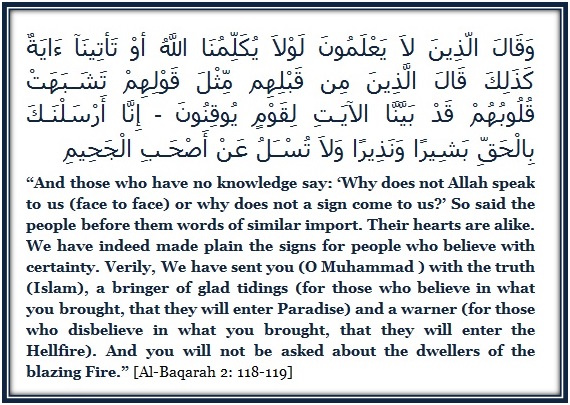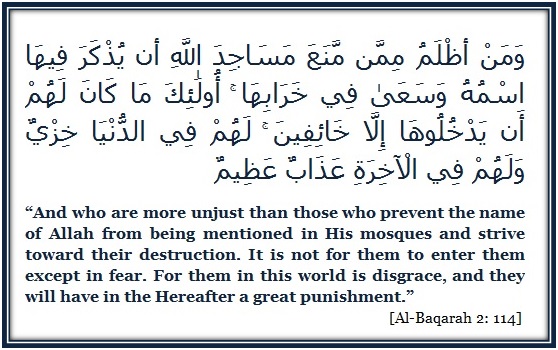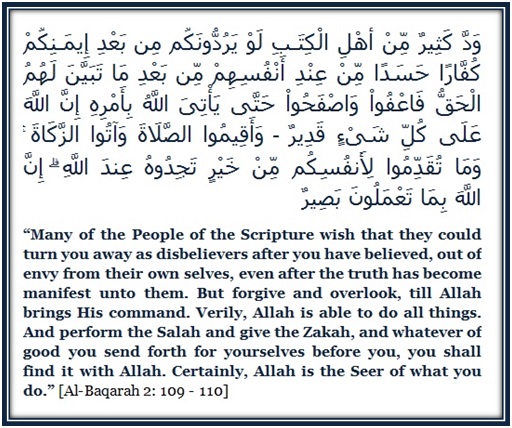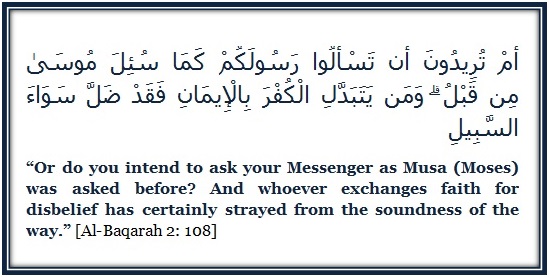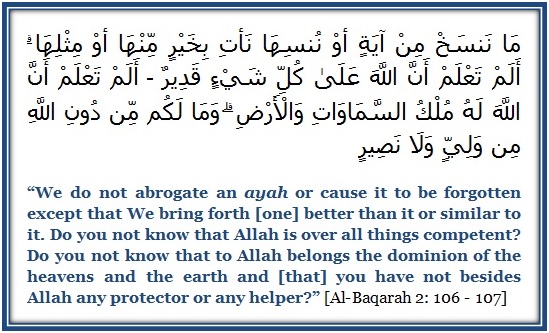Entering Paradise depends on Our Belief and Righteous Deeds
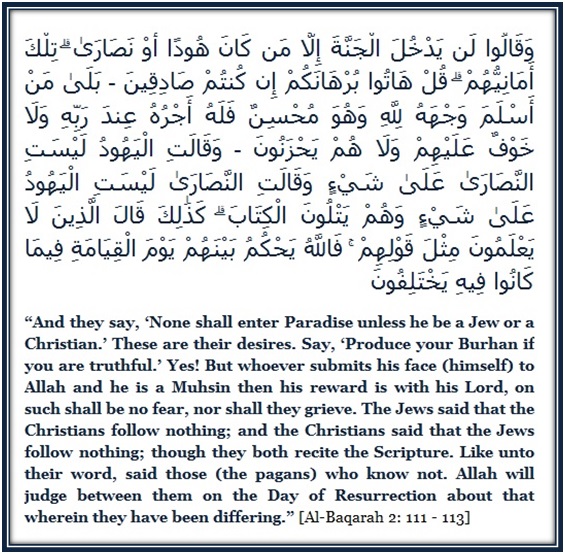 |
| Surah Baqarah Verse 111-113 |
The Jews and the Christians were hostile not only to the Muslims, but also to each other. They had forgotten the essence of religion that is, adherence to the true and authentic doctrines, and performance of good deeds as laid down by the Shar’iah. They had identified it with a mere affiliation to a racial or social community. Each of the two groups claimed that it had the exclusive right to go to the Paradise, without having any argument to substantiate the claim. The Jews read the Torah, while the Christians read the Evangel, and they could have easily seen that the two Books confirm each other. Each party used to assert, in its malice, that the religion of the other was baseless. This gave an excuse to the mushrikeen (polytheists) who, in spite of their ignorance, began to say the same of both the religions.
The Qur’an dismisses these pretensions as mere fancy and self-delusion. It declares that other people too will go to Paradise, who, in their time, have been following the Shar’iah of their prophet, and who now that the Qur’an has abrogated all the earlier Divine Books, follow the Islamic Shar’iah.
(Note that the meaning of the word Shar’iah in itself is ‘law’ and there is no such word as Shar’iah law.)
The Jews had previously made similar claims which were refuted by Allah subhanahu wa ta’ala. For example, they said: “We are the children of Allah and His loved ones.” (Al-Ma’idah 5:18)
Previously we mentioned their claim that the Fire would not touch them for more than a few days, after which they would be put in Paradise. Allah subhanahu wa ta’ala rebuked this claim, and He said about this baseless claim, “…these are their desires,” meaning these are wishes that they wished Allah subhanahu wa ta’ala would answer without basis.
Allah subhanahu wa ta’ala instructs the Prophet salAllahu ‘alayhi wa sallam to ask them for Burhan. The word burhan [بُرْهَـن] is from the root ba-ra-ha-noon and it means ‘evidence, proof or argument’.
The ayah means bring the evidence that supports your statement if you are truthful in your claim.
LESSONS:
We learn the requirement of a proof or evidence for basing our opinions. We cannot say anything (especially when it pertains to religion) unless it is supported by a valid proof such as an ayah from the Qur’an, a Prophetic tradition or a saying of the Companions radhiAllahu ‘anhum.
There are two kinds of followers of religion: those who follow it on the basis of knowledge and those who follow it in veneration. The latter group might have no knowledge of the religion and their only association is reverence for the Prophet salAllahu ‘alayhi wa sallam and his Companions. Following Deen without knowledge is dangerous, as there is a fear of falling into innovations and Shirk [associating partners with Allah].
One will not enter Paradise by belonging to a certain sect, rather our actions should be based on what the Qur’an and Sunnah teach us.
Ayah 112
Ayah 112 lays down the general principle in this respect. The essence of religion whether it be Islam, Christianity or Judaism lies in two things:
(1) obedience to Allah subhanahu wa ta’ala in one’s belief as well as in one’s actions and
(2) submission to the Divine commands in all sincerity.
It should be noted that it is not enough to have a sincere intention to obey Allah subhanahu wa ta’ala and then to invent according to one’s own fancy, the modes and forms of obedience. It is absolutely essential that the forms of worship and the modes of obedience should be no other than those which Allah subhanahu wa ta’ala Himself has appointed through His prophets.
The Arabic word aslama [أَسْلَمَ] signifies total submission to Allah subhanahu wa ta’ala, and the word Muhsin [مُحْسِن] signifies one who performs good deeds.
We learn there are two conditions for a deed to be accepted: one, it must be performed for the sake of Allah subhanahu wa ta’ala alone (if one does a good deed to gather praises from the people, then his deed will be rejected), and two, it must conform to the Shar’iah (i.e. it should be based on the teachings of the Prophet salAllahu ‘alayhi wa sallam. We cannot invent our ways of worship.) When the deed is sincere, but does not conform to the Shar’iah, then it will not be accepted.
The Messenger of Allah salAllahu ‘alayhi wa sallam said,
مَنْ عَمِلَ عَمَلًا لَيْسَ عَلَيْهِ أَمْرُنَا فَهُوَ رَد
“Whoever performs a deed that does not conform with our matter (religion), then it will be rejected.” [Muslim]
Therefore, the good deeds of the priests and rabbis will not be accepted, even if they are sincerely for Allah subhanahu wa ta’ala alone, because these deeds do not conform with the method of the Messenger salAllahu ‘alayhi wa sallam, who was sent for all mankind. Allah subhanahu wa ta’ala said regarding such cases, “And We shall turn to whatever deeds they (disbelievers, polytheists, sinners) did, and We shall make such deeds as scattered floating particles of dust,” (Surah Al-Furqan 25:23). In Surah An-Nur ayah 39, He says, “As for those who disbelieved, their deeds are like a mirage in a desert. The thirsty one thinks it to be water, until he comes up to it, he finds it to be nothing.” (24:39)
When the deed conforms to the Shar’iah outwardly, but the person did not perform it sincerely for Allah subhanahu wa ta’ala alone, the deed will also be rejected, as in the case of the hypocrites and those who do their deeds to show off. About them it was said, “Verily, the hypocrites seek to deceive Allah, but it is He Who deceives them. And when they stand up for As-Salah (the prayer), they stand with laziness to be seen by people, and they do not remember Allah but little.” (An-Nisa 4:142)
In Surah Al-Ma’un it was said,
فَوَيْلٌ لِّلْمُصَلِّينَ – الَّذِينَ هُمْ عَن صَلَـتِهِمْ سَاهُونَ – الَّذِينَ هُمْ يُرَآءُونَ – وَيَمْنَعُونَ الْمَاعُونَ
“So woe unto those performers of Salah (prayers). Those who delay their Salah (from their stated fixed times). Those who do good deeds only to be seen. And withhold small kindnesses.” (107:4-7)
Allah subhanahu wa ta’ala says whoever submits to Him sincerely and does good deeds then he will find his reward with his Lord. Such a person has guaranteed rewards and safety from what they fear and grieve about what they abandoned in the past. They will have no fear on the Day of Judgment or grief about their imminent death. It has been recorded in the Qur’an and ahadeeth that when a righteous person dies (and he is a believers), the angels that descend at the time of death are kind and merciful to him and give him the glad tidings of Paradise. May Allah subhanahu wa ta’ala make us of those who will receive good tidings, ameen.
LESSONS:
We learn the need to submit ourselves to Allah subhanahu wa ta’ala. What does that mean? It means putting the commands of Allah subhanahu wa ta’ala before our desires. When it is time for prayer and you are doing something else, leave that work and perform the prayer first. When someone else is in need but you want to buy something for yourself (it’s a desire not a need), you put your wish behind and give in the way of Allah subhanahu wa ta’ala seeking His pleasure alone.
If the condition for deeds to be accepted is that they must conform to the Sunnah, then we must learn the Sunnah of the Prophet salAllahu ‘alayhi wa sallam and make our deeds solely for Allah subhanahu wa ta’ala and not for looking good in the eyes of the people.
We should raise the standard of our deeds and do everything with excellence and perfection. When we do not accept an average thing, why do we give Allah subhanahu wa ta’ala mediocre deeds? When we face difficulty in the path of Allah subhanahu wa ta’ala we should ask Him for help, and bear everything with excellent patience.
The Arguments between the Jews and Christians
In ayah 113, Allah subhanahu wa ta’ala says, “The Jews said that the Christians follow nothing (i.e. are not on the right religion); and the Christians said that the Jews follow nothing (i.e. are not on the right religion); though they both recite the Scripture.”
Muhammad bin Ishaq reported that Ibn ‘Abbas radhiAllahu ‘anhu said, “When a delegation of Christians from Najran came to the Messenger of Allah salAllahu ‘alayhi wa sallam, the Jewish rabbis came and began arguing with them before the Messenger of Allah. Rafi’ bin Huraymilah said, ‘You do not follow anything,’ and he reiterated his disbelief in Jesus and the Injeel (Gospel).
Then a Christian man from Najran’s delegation said to the Jews, ‘Rather, you do not follow anything,’ and he reiterated his rejection of Musa’s [Moses] prophethood and his disbelief in the Torah. So, Allah subhanahu wa ta’ala revealed this ayah.”
Ibn Katheer writes that Allah subhanahu wa ta’ala made it clear that each party read the affirmation of what they claimed to reject in their Book. Consequently, the Jews disbelieve in Jesus, even though they have the Torah in which Allah subhanahu wa ta’ala took their Covenant by the tongue of Moses to believe in Jesus. Also, the Gospel contains Jesus’ assertion that Moses’ prophethood and the Torah came from Allah subhanahu wa ta’ala. Yet, each party disbelieved in what the other party had.
Allah subhanahu wa ta’ala says that He will decide on the Day of Judgment who is on the right religion and who has gone astray.
These ayaat provide a warning to the Muslims as well. Merely, being born in a Muslim family or embracing Islam does not mean you have got your confirmed ticket to the Paradise. Sincere belief in and submission to Allah subhanahu wa ta’ala, and righteous deeds that conform to the teachings of the Prophet Muhammad salAllahu ‘alayhi wa sallam are mandatory.
Mufti Muhammad Shafi Usmani writes in his Maarif-ul-Qur’an: Muslims have no right to hope for these rewards until and unless they submit themselves totally, in thought and deed both, to the commandments of Allah subhanahu wa ta’ala and His Prophet salAllahu ‘alayhi wa sallam.
